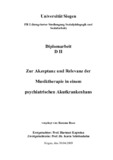Citation link:
https://nbn-resolving.org/urn:nbn:de:hbz:467-3956| DC Field | Value | Language |
|---|---|---|
| dc.contributor.author | Hesse, Ramona | - |
| dc.date.accessioned | 2019-09-02T09:57:23Z | - |
| dc.date.available | 2009-11-2T12:12:12Z | - |
| dc.date.available | 2019-09-02T09:57:23Z | - |
| dc.date.issued | 2009 | - |
| dc.description.abstract | Nach einer kurzen Einführung in Schulen und Methoden von Musiktherapie, wird die Gruppenmusiktherapie in einem akutpsychiatrischen Krankenhaus multiperspektivisch betrachtet. Die Forscherperspektive wird durch teilnehmende Beobachtung eingenommen, die Therapeutenperspektive kommt in einem Experteninterview zum Ausdruck, die Patientenperspektive wird mittels Fragebogen erhoben. Ausgewertet werden die erhobenen Daten mit der Methode der Grounded Theory. Die Untersuchung zeigt, dass die dokumentierte Mischform aus rezeptiver und aktiver Musiktherapie im halboffenen Gruppenformat bei den psychiatrischen Patienten in erster Linie zu einer Entlastung führt. Bei längerfristiger Teilnahme an der Gruppenmusiktherapie, teilweise in Kombination mit parallel stattfindender Einzelmusiktherapie, sind darüber hinaus Entwicklungen zu beobachten. Die Auswertung des strukturierten Patientenfragebogens verdeutlicht eine vornehmlich passiv-empfangende Haltung bei den überwiegend depressiven Patienten. | de |
| dc.description.abstract | Following a general view on schools and methods of musictherapy, the musictherapeutic setting in an psychiatric hospital is examinated from different points of view. "Participant observation" shows the researchers observations, an "expert interview" figures out the therapists point of view on his methods and interventions and an "questionary" asks for the patient's opinions about music therapy. The evaluation of the gained material has been done by the methode of "grounded theory". The results show, that the observed mixture of music reception and active methods in the semi-opened group therapy setting, leads to relief of the burden on the psychiatric patients. The evaluation of the questionairy shows, that there is mainly a passiv attitude with the mostly depressiv patients. In cases of longer enduring participance in the group therapy, in some cases even in combination with individual therapy, development could be observed. | en |
| dc.identifier.uri | https://dspace.ub.uni-siegen.de/handle/ubsi/395 | - |
| dc.identifier.urn | urn:nbn:de:hbz:467-3956 | - |
| dc.language.iso | de | de |
| dc.rights.uri | https://dspace.ub.uni-siegen.de/static/license.txt | de |
| dc.subject.ddc | 780 Musik | de |
| dc.subject.other | Patientenbefragung | de |
| dc.subject.other | Depression | de |
| dc.subject.other | Gruppenmusiktherapie, Trommelspiel | de |
| dc.subject.other | Improvisation | de |
| dc.subject.other | patients opinion poll | en |
| dc.subject.other | depression | en |
| dc.subject.other | group music therapy | en |
| dc.subject.swb | Musiktherapie | de |
| dc.subject.swb | Psychische Störung | de |
| dc.subject.swb | Teilnehmende Beobachtung | de |
| dc.subject.swb | Experteninterview | de |
| dc.subject.swb | Grounded theory | de |
| dc.title | Zur Akzeptanz und Relevanz der Musiktherapie in einem psychiatrischen Akutkrankenhaus | de |
| dc.title.alternative | Acceptance and relevance of musictherapy in a psychiatric hospital | en |
| dc.type | Master Thesis | de |
| item.fulltext | With Fulltext | - |
| ubsi.publication.affiliation | Fachbereich 2, Erziehungswissenschaft und Psychologie | de |
| ubsi.subject.ghbs | KGR | - |
| ubsi.type.version | publishedVersion | de |
| Appears in Collections: | Hochschulschriften | |
This item is protected by original copyright |
Page view(s)
847
checked on Nov 25, 2024
Download(s)
1,377
checked on Nov 25, 2024
Google ScholarTM
Check
Items in DSpace are protected by copyright, with all rights reserved, unless otherwise indicated.


